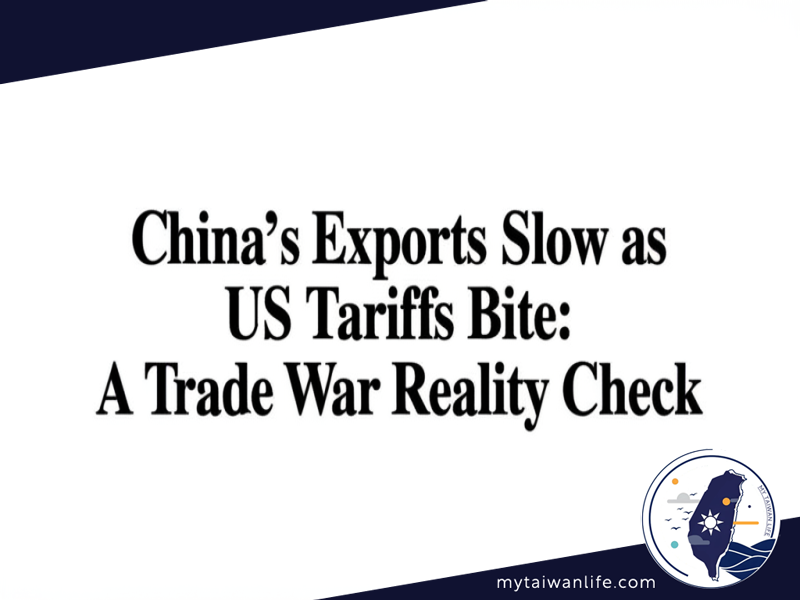China's Exports Slow as US Tariffs Bite: A Trade War Reality Check
The impact of Donald Trump's tariffs on China's exports is becoming clear, casting a shadow over the world's two largest economies and adding pressure to de-escalation talks in Geneva.

China's export growth significantly slowed in April, a direct consequence of the triple-digit tariffs imposed by Donald Trump. This development underscores the widening damage inflicted by the ongoing trade war on the world's two economic powerhouses, just as they gear up for crucial de-escalation discussions.
Outbound shipments from China saw an 8.1% increase in US dollar terms last month, as revealed by customs data released on Friday. This marks a notable decrease from the 12.4% growth witnessed in March, when businesses scrambled to dispatch orders ahead of the imposition of hefty tariffs. Furthermore, China’s exports to the US fell by 2.5% in April, and imports from the US declined by 4.7%.
Although the trade figures were not as dire as some economists predicted, they contribute to a growing body of economic data that highlights the considerable impact the trade war is already having on both the Chinese and US economies. Official data released last week indicated that China's factory activity contracted at its quickest pace in 16 months during April, intensifying the urgency for Beijing to deploy new economic stimulus measures.
Meanwhile, the US economy faced a downturn in the first quarter, marking its first contraction in three years. This contraction was attributed to businesses stockpiling goods in anticipation of Trump's “Liberation Day” tariffs, which were implemented in April.
These stark figures are particularly relevant as Trump's top trade officials prepare to meet their Chinese counterparts in Geneva, Switzerland, this weekend, to discuss a possible de-escalation of the tariff war. The US has levied tariffs of at least 145% on most Chinese imports, and China has reciprocated with tariffs of 125% on most US imports. Logistics experts suggest that this has led to a sharp decline in trade between the two countries.
Ships arriving at US harbors from China are now subject to the tariffs imposed on most Chinese imports, a situation which, in the coming weeks, could lead to higher prices and shortages for consumers.
US Treasury Secretary Scott Bessent, participating in the Geneva talks alongside Trade Representative Jamieson Greer, has expressed cautious optimism, stating that he is merely hoping for “de-escalation.” On Wednesday, Trump declared that he would not consider lowering the high tariffs on China before the talks, a move that Beijing had previously stated as a precondition for negotiations. The President also mentioned he would raise the case of jailed Hong Kong media tycoon Jimmy Lai "as part of the negotiation."
According to Reuters, citing anonymous sources, the negotiating teams are expected to address tariff reductions, specific product duties, export controls, and Trump's decision to end de minimis exemptions on low-value imports.
This is an ongoing story, with updates to follow.
Other Versions
China frena sus exportaciones por los aranceles de EE.UU.: la realidad de la guerra comercial
Les exportations chinoises ralentissent sous l'effet des tarifs douaniers américains : le point sur la réalité de la guerre commerciale
Ekspor China Melambat karena Tarif AS Menggigit: Pemeriksaan Realitas Perang Dagang
Le esportazioni cinesi rallentano mentre i dazi statunitensi mordono: una verifica della realtà della guerra commerciale
米国の関税引き上げで中国の輸出が鈍化:貿易戦争の現実を見る
미국의 관세 부과로 중국의 수출 둔화: 무역 전쟁의 현실 점검
Bumabagal ang Pagluluwas ng Tsina Habang Tumatama ang mga Taripa ng US: Isang Pagsusuri sa Katotohanan ng Digmaang Pangkalakalan
Китайский экспорт замедляется по мере роста тарифов США: проверка реальности торговой войны
ส่งออกของจีนชะลอตัวเมื่อมาตรการกีดกันของสหรัฐฯ เริ่มส่งผลกระทบ: บทสรุปความจริงของสงคราม
Xuất khẩu của Trung Quốc chậm lại do thuế quan của Mỹ gây ảnh hưởng: Nhìn nhận thực tế về cuộc chiến thương mại

